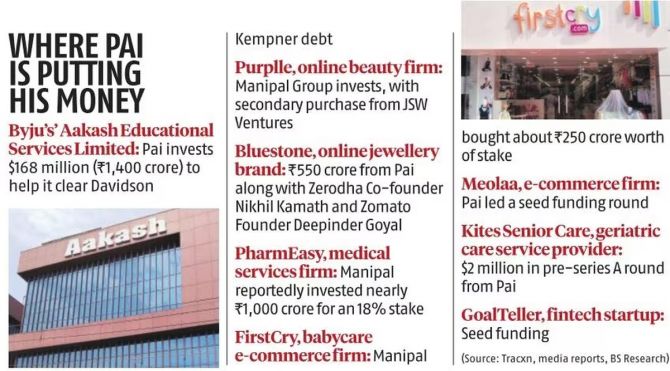‘Considering Ranjan Pai is putting his own personal money in Byju’s, stakeholders in the company can look forward to more governance and transparency.’
The legend goes that about three decades ago, when Ranjan Pai was looking to study medicine, he failed to get into Manipal medical college, which was run by his father.
It was only after a year of good grades at the medical college in Davanagere, which Pai ended up joining, that he was admitted into Manipal.
That may have infused the incumbent chairman of the Manipal Education and Medical Group with a special regard for things related to education.
So in 2012, when Pai discovered by happenstance that the Fortune Inn Valley View hotel in Manipal was buzzing because teacher-turned-entrepreneur Byju Raveendran was holding classes there, Pai was intrigued, impressed, and interested.
The following year, Aarin Capital, founded by Ranjan Pai and former Infosys honcho T V Mohandas Pai — they are not related — became the first institutional investor in Byju’s, which went on to become a digital phenomenon.
Aarin eventually exited the company with bumper returns over the years as Byju’s raised more than $5 billion over the past decade. And its timing was good.
For, the present is not great for Byju’s, which is besieged with issues that are not just about its plummeting valuation.
Given the past and the present, it was not a surprise that early this year Raveendran reached out to Pai and the outcome has been prompt.
Pai is putting $168 million (Rs 1,400 crore/Rs 14 billion) in Byju’s test-prep subsidiary, Aakash Educational Services Limited.
This would help repay the loan from United States-based investment firm Davidson Kempner Capital Management, one that has led to legal issues.
Pai, say sources, is also in discussions to invest another $350 million as equity and debt in Byju’s.
“Raveendran knows Ranjan Pai and Mohandas Pai very closely,” says a person aware of the negotiations. “He shares a good comfort level with them.”
K Ganesh, who has launched and exited four successful ventures, says Pai is a savvy, mature, and patient investor.
Pai was an investor in Ganesh’s online tutoring firm, TutorVista, which was acquired by UK’s Pearson in a deal that valued the company at about Rs 1,000 crore in 2011.
“He (Pai) is not driven by the fear of missing out,” says Ganesh, who is also the promoter and founder director of BigBasket, Portea Medical, Bluestone, and HomeLane. “He is investing in Aakash as it is a very good asset and doing well.”
More than a financial play?
In May 2023, Bengaluru-based Byju’s signed a Rs 2,000 crore (Rs 20 billion/$250 million) round with Davidson Kempner in a structured instruments deal.
It was a loan and had an equity upside linked to Aakash’s public listing in the near future, according to sources.
However, the firm received only about Rs 800 crore (Rs 8 billion), after allegations of contractual violations were levied.
Talks to return the money started by the end of June. Byju’s and Davidson Kempner then began negotiations to settle their dispute.
Byju’s is paying about Rs 1,400 crore (Rs 14 billion), which includes the interest. The firm recently offered to repay the entire term loan B in less than six months.
Sources say it may have put two of its assets — Epic and Great Learning — on the block to generate $800 million to $1 billion.
However, some wonder if there is more to Pai’s investments in Aakash and are watching the extent to which he might want to get involved.
“This is expected to help Aakash square off their debt,” says Jaideep Kewalramani, head of employability business and chief operating officer, TeamLease Edtech, a learning and employability solutions company that works with universities and companies. “It would be interesting to see if Mr Pai joins the board of directors.”
Manipal Academy of Higher Education is one of the biggest players in the traditional education space.
“He (Pai) is an active player in the higher education space and this will be a very strategic deal for him and not just a financial investment,” says Shantanu Rooj, founder and CEO, TeamLease Edtech. “Also, Aakash is a crown jewel at Byju’s.”
Pai, who recently sold a significant part of his stake in Manipal Health Enterprises to Singapore’s sovereign wealth fund Temasek, has been backing new-age companies this year. These include Purplle, Bluestone, PharmEasy, FirstCry and Meolaa.
Cleaning up
Pai’s role is expected to sort out issues that go beyond mere finances.
“It seems Ranjan Pai’s investment is a chance for Byju’s to clean things up,” says another industry source.
The edtech firm has delayed the submission of its FY22 results to the ministry of corporate affairs, trailing other edtech unicorns such as Unacademy, upGrad, and Vedantu.
This delay has raised concerns among investors and lenders who have extended a $1.2 billion term loan B to the firm.
This year, Byju’s auditor, Deloitte Haskins & Sells, resigned citing the delay in filing financial results.
Following the auditor’s resignation, representatives from the firm’s top three investors — Prosus, Peak XV Partners, and the Chan Zuckerberg Initiative — also resigned.
Recently, Byju’s appointed BDO as its statutory auditor for the next five years and formed an advisory council. It is expected to file its financials with the ministry in the coming weeks.
“Considering he (Pai) is putting his own personal money in Byju’s, (stakeholders) in the company can look forward to more governance and transparency,” says Ganesh.
“This is also a strong indication that whatever may be the challenge, Pai has confidence in the founder, Raveendran.”
Think and Learn Private Limited, Byju’s parent company, reported a 2.3-fold increase in its core business, reaching a total income of Rs 3,569 crore (Rs 35.69 billion) for 2021-2022, up from Rs 1,552 crore (Rs 15.52 billion) in the previous year.
The Ebitda loss of the core business decreased from Rs 2,406 crore (Rs 24,06 billion) to Rs 2,253 crore (Rs 22.53 billion), accompanied by a margin improvement from -155 per cent to -63 per cent, from FY21 to FY22. Ebitda is short for earnings before interest, tax, depreciation, and amortisation.
These financials reflect the core business. At the group level, the situation may be different, according to sources.
Previously, the company aimed to turn profitable by March 2023. Instead, it reported losses of Rs 4,588 crore (Rs 45.88 billion) for FY21, 19 times more than the previous year.
How will its life with Pai be?
Feature Presentation: Rajesh Alva/Rediff.com
Source: Read Full Article



